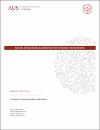Browsing Finance & Economics by Subject "Corruption"
Now showing items 1-16 of 16
-
Corruption and Economic Development
( Palgrave Macmillan , 2016 , Book chapter)Corruption is believed to be widespread and it adversely affects countries at different intervals, in different degrees. Corruption scandals show that bribes are commonplace and that even societies that are supposedly free ... -
Corruption and Economic Development: New Evidence from the Middle Eastern and North African Countries
( Elsevier B.V. , 2017 , Article)This paper analyses the role of economic development in curbing corruption by focusing on political and economic freedoms for a sample of Middle Eastern and North African (MENA) countries over the period 1984-2013. In ... -
Corruption and public spending on education and health
( Routledge , 2019 , Article)Existing country and regional studies show that the effect of corruption on public spending on health and education is mixed. This letter reveals that the effect of corruption on health and education spending is significant ... -
Corruption in Africa: What role does ICT diffusion play
( Elsevier Ltd , 2017 , Article)This paper assesses the determinants of corruption in Africa and focuses on the effect of ICT diffusion on corruption. Using a sample of 47 African countries over the period from 1996 to 2014, empirical findings provide ... -
Corruption, lending and bank performance
( American University of Sharjah , 2019 , Conference Paper)This paper uses a sample of 7235 banks from 160 countries between 2000 and 2016 to investigate the link between corruption, lending and bank performance. It considers both country- and bank-level corruption. The study finds ... -
Corruption, lending and bank performance
( Elsevier Inc. , 2024 , Article)This paper uses a sample of 7235 banks from 160 countries between 2000 and 2016 to investigate the link between corruption, lending and bank performance. It considers both country- and bank-level corruption. The study finds ... -
Credit bureaus and financial constraints do corruption matter?
( Routledge , 2022 , Article)This study aims to assess whether or not the presence of credit bureaus is associated with more or fewer financing constraints while considering the interfering effect of corruption in a sample of 18 countries in Eastern ... -
Credit bureaus, corruption and banking stability
( Elsevier , 2022 , Article)This study assesses the impact that credit bureaus can have on the occurrence of banking crises, using data for 32 countries over the period 2004-2016 while considering the interference effect of corruption. Different ... -
Digitalization and Banking Crisis: A Nonlinear Relationship?
( Springer , 2022 , Article)This study assesses the impact that ICT can have on the occurrence of banking crisis for a sample of 113 countries over the period 1996-2017 while considering the interfering role of corruption and the potential existence ... -
Does ICT diffusion matter for corruption? An Economic Development Perspective
( Elsevier , 2017 , Article)This study assess the impact of ICT diffusion on corruption by using instrumental variables method on a panel data set of 175 countries over the period 1996-2014. We check for the stability of the ICT-corruption nexus for ... -
Does ICT promote democracy similarily in developed and developing countries? A linear and nonlinear panel threshold framework
( Elsevier , 2020 , Article)This paper assesses the impact of ICT adoption on democracy for a panel of 70 countries over the period 2000-2017. We consider two different measures of ICT and check for the stability of the relationship for different ... -
Economic development in the middle east and North Africa: Challenges and prospects
( Palgrave Macmillan , 2016 , Book)Using cases on individual countries, Economic Development in the Middle East and North Africa offers diverse theoretical and empirical evidence on a variety of issues facing policymakers, investors, and other stakeholders ... -
How does corruption undermine banking stability? A threshold nonlinear framework
( Elsevier , 2020 , Article)This study assesses the effect of corruption on the occurrence of banking crises for a sample of 38 countries over the period 2000-2017. We consider both the direct and the indirect channels through which corruption might ... -
The corruption-inflation nexus: Evidence from developed and developing countries
( Walter de Gruyter GmbH , 2016 , Article)This paper analyzes the relationship between corruption and inflation for a sample of 100 developing and developed countries representing five regions (Americas, Europe, Middle East and North Africa, Sub-Saharan Africa and ... -
The middle east and North Africa: Cursed by natural resources?
( Palgrave Macmillan , 2016 , Book chapter)The relationship between natural resource wealth and economic growth has been extensively studied. As opposed to basic intuition, the results of several empirical studies suggest that vast natural capital endowments don’t ... -
The role of ICT adoption in curbing corruption in developing countries
( Springer International Publishing , 2017 , Book chapter)Corruption is regarded as a major problem impeding development potentialities, and curbing it is a leading challenge for developing countries. This chapter assesses the possibilities of ICT adoption as a powerful tool for ...






